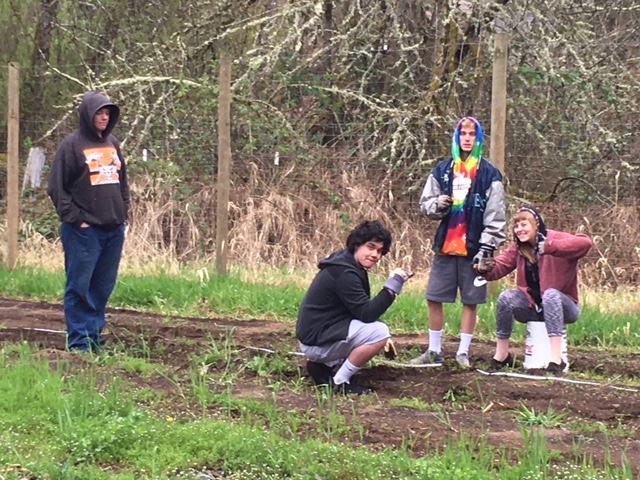On April 17, a crew of six high school students helped build a garden for a low-income family. Fourteen others stayed at FRESH’s (Farm-Rooted Education for Sustainability and Health) Tumwater farm at Isabella Bush Park to install irrigation, move compost, and plant carrots, radishes, kale, and cabbage. It was a busy season for FRESH students as they prepared for a volunteer day on the April 21 and the plant sale at the Tumwater High School greenhouse in May, all while continuing projects and learning at the farm.
“FRESH is a farm-based model of high school education,” explains Kristen Maring, who teaches for and manages the program. The program began in early 2016, using the model of its parent organization, GRuB, which has served the Olympia School District for twenty-some years. This year, 20 students from Black Hills High School and Tumwater High School participated in the program.
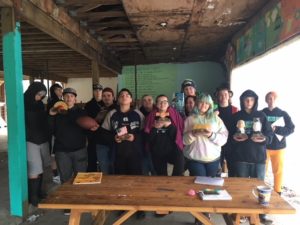
Students might join FRESH for a variety of reasons – some want more hands-on educational experience, while others need to get back on track to graduate. Through FRESH’s year-long program, students have the opportunity to catch up on school credits by learning and working on the farm. However, FRESH is about much more than just credits – it is about relationships, skill-building and learning how best to create positive change in students’ lives and in their communities. “We’re growing food, but we’re also growing people,” Maring explains.
The students are bussed to Isabella Bush Park in Tumwater after spending three class periods at their high schools. Once there, they start with a group “circle” in the barn, followed by an open question and game that helps break the ice. Kristen Maring, teacher and manager of the program, says this is one of FRESH’s short-term goals – creating a “safe, close-knit group of people there to support students every day,” like an at-school family. If a student is struggling, they always have peers and staff to turn to for help.
After this, students delve into learning. With Maring, they learn about the environment, civics and agriculture, and explore how these topics are interrelated in their community. Topics include food scarcity, sustainable farming and related legislature. However, FRESH students don’t just learn these things in isolation; they experience them, while learning valuable skills.
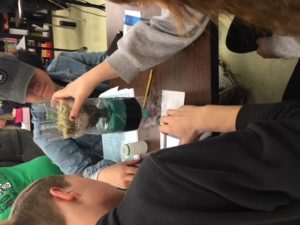
“They are learning a lot about hard work,” says Maring as she recalls the students moving 15 yards of compost that day. Each day, students work on maintaining the farm and its crops, and during the growing season, they stay until 3:45 p.m., after school ends. The extra credit earned from staying later helps students in need of more credits for graduation. Students also earn an elective credit during FRESH’s intensive seven-week training program over the summer, during which students are provided with a $1,000 stipend.
Beyond work ethic, “If they spend a year with us,” Maring explains, “they develop leadership and communication skills – learning ways to be more effective.” At events like the volunteer day and plant sale, students take leadership roles, write and deliver speeches, and help plan. Students also engage in a weekly field trips, communication workshops and team-building activities. “Here,” Maring says, “students cultivate skills to take charge of their own lives.” The hope is that students will not only take these skills back with them to school the next year, and to their job later on, but also out into the community.
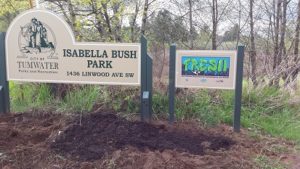
Community, after all, is key to FRESH. “The program is a partnership between the school district and the city of Tumwater,” explains Maring. FRESH depends on school counselors and administrators during the recruiting process, which happens at the end of the school year, before the summer training period begins. If a student is recruited and is interested in the program, they then fill out an application and sit for an interview. Some students learn about the program via alumni or word-of-mouth. The city has supported FRESH by providing a new roof, waterlines for irrigation, and, of course, the site for the farm. FRESH in turn helps bring more fresh food into the community; they deliver their produce to the Tumwater High School cafeteria and the Peter G. Schmidt Elementary backpack program, which helps students in need.
By April 2018, the students and staff of FRESH had delivered 3,000 pounds of produce to the school district. FRESH’s crops also find their way into the homes of FRESH students and families in need. The community continues to support FRESH at its annual plant sale; many businesses donate start-up costs for the sale so that its profits can go straight back to the program.
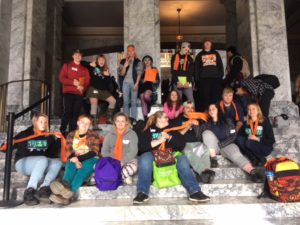
The ultimate goal of FRESH is that its alumni will continue to make a positive impact on their community. During the program, students learn about laws regarding the environment and other topics they study, visit the Capitol, and learn how to contact the legislature themselves.
“We hope that these students will go forth into their community and make change…that they will do great things,” Maring says. Combined with the new perspective students gain about the environment, food, and their community, and the skills they strengthen over the year, FRESH students are well-equipped for creating this positive change.


































